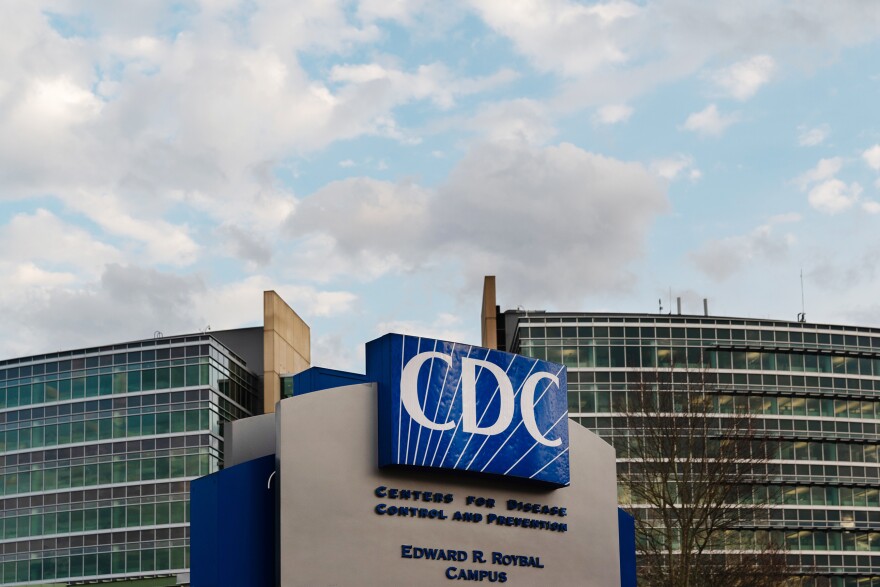Updated at 7:20 p.m. ET
The Centers for Disease Control and Prevention is funding 650 health workers at state health departments to supplement more than 600 CDC staff already in place, according to director Dr. Robert Redfield.
Redfield says it's part of an effort to expand the nation's public health workforce. The goal is to ensure every community can do enough testing and contact tracing to prevent any big new outbreaks from occurring.
"As we open up, we need to reset our sights on what the primary strategy is to control this virus and that has got to be containment. And that means we have to have the testing and capacity to contain-contain-contain this virus," he says.
Redfield says the CDC is providing $45 million for these new hires, which include epidemiologists, nurses, microbiologists, lab technicians and others — plus a regional director for each of 10 regions. The funding will cover new positions for up to a year.
The CDC director also says the agency has started talking with other federal agencies including the Census Bureau, as well programs like the Peace Corps and AmeriCorps, to see if they might be able to provide some of the thousands of additional workers states will need. He says his agency is helping state health departments develop workforce expansion plans.
"We are in the process of rapidly accelerating the human capacity that will be available to the states," Redfield says.
Redfield also says the CDC has formed what he calls "community protection teams" that have been sent to nine states where there haven't been any big problems so far. The agency wants to make sure they stay that way. Each team is comprised of four to six members.
Teams have also been sent to four other states to do things like create early warning systems to spot outbreaks in places that might be particularly vulnerable, including nursing homes. In addition, the agency says it's providing grants to the CDC Foundation to help states hire more workers around the country.
NPR's Rob Stein spoke to Redfield about the CDC's plans. Here are highlights from that interview.
On the reason for the CDC's plan to add 650 public health positions:
A critical part of opening up America again is to make sure we have the public health capacity to stay in what I call containment mode: that is early case identification, isolation and contact tracing. At the first wave that we just went through, we were in containment pretty much through January and February. But as March came, the public health capacity was overwhelmed.
[The] CDC now has about 500 people embedded in the states across the country, as well as nearly another hundred individuals responding to COVID-specific outbreaks — more than 20 across the country.
We'll be expanding [in] each of the states in the country so that we'll have a COVID response corps [of] CDC personnel ... Every state is going to have a CDC COVID response team in its state working side by side with them.
On how the CDC plans to further support states' contact tracing efforts:
We're prepared to expand the public health workforce for contact tracing to the extent that we need it, whether it's 10,000, 20,000, 30,000, 50,000. We need to begin to define that number of public health contact tracers we need across this nation.
It's going to be different in each state. Some jurisdictions are looking at taking the resources that we're providing them and starting what we call public health associate programs. These are young people, graduated from college, and [states] giving them an opportunity to practice public health.
We think one of the critical components is an ability to diagnose influenza-like illness ... and do contact tracing around it. [The] CDC is there to help guide that, train and mentor that development and partnership of state, local, tribal territory health departments. And now that process is in play as we speak... Many [states] have actually begun plans of their own to contribute to this overall requirement of a strongly enhanced public health workforce.
On the COVID-19 challenges the CDC sees on the horizon:
I'm probably less concerned about this summer in terms of the magnitude of what we need. Others may disagree with me, but I am very concerned about the magnitude of functional public health capacity we're going to need next November, December, January and February. We can't let the public health system get overwhelmed. I think the different states will open up again in a measured, stepwise fashion. It's not like we turn a light switch and everybody's back to full non-mitigation.
A lot of the stuff that we're doing now — social distancing, limited human gatherings — a number of these things are going to continue. But the centerpiece of our response needs to be the tried-and-true, proven-to-work public health response of early case recognition, diagnosis, isolation and contact tracing.
There are jurisdictions that clearly have the testing capacity that they need to reopen. There's other jurisdictions that think they don't have it, but they may find out, if they look at all the laboratory capacity they have in their state, that they actually do have it. And there'll be other states that need augmentation of that capacity and there needs to be a strategic plan for them to get that in place.
Copyright 2021 NPR. To see more, visit https://www.npr.org. 9(MDA1MTkyNjA1MDEyNzM1MTQ0ODk3NTA1NA004))





